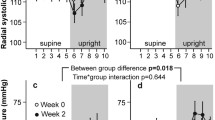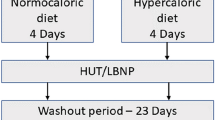Abstract
To investigate the role of glucose and insulin in the development of hypotension following glucose ingestion in elderly subjects with orthostatic hypotension, the autonomic responses to glucose and xylose ingestion were studied in five elderly subjects with age related orthostatic hypotension (without autonomic failure), five elderly control subjects and three elderly subjects with evidence of autonomic failure. Heart rate, blood pressure, plasma noradrenaline and plasma arginine vasopressin responses to glucose ingestion and to xylose ingestion were investigated. All subjects were supine for 90 min following ingestion of each carbohydrate and were then tilted 45° head-up for 10 min. Blood pressure was maintained in elderly control subjects following ingestion of both carbohydrates and during tilting. The elderly group with orthostatic hypotension, while supine had a fall in systolic blood pressure 60–90 min following both glucose and xylose ingestion. Diastolic blood pressure was lowered 60–90 min after glucose but not xylose. During tilting, blood pressure fell by similar levels following both carbohydrate ingestions; plasma noradrenaline levels after 2 min and plasma arginine vasopressin levels after 10 min tilting were significantly less following glucose ingestion compared to xylose ingestion. The autonomic failure group while supine had a fall in systolic blood pressure 60–90 min following both glucose and xylose ingestion. Diastolic blood pressure was lowered 60–90 min after glucose but not xylose. During tilting, blood pressure fell by similar levels following both carbohydrate ingestion. Plasma noradrenaline and arginine vasopressin levels were unchanged after ingestion of either carbohydrate, and during tilting. These results suggest that hypotension following glucose ingestion in elderly subjects with orthostatic hypotension, but without efferent autonomic failure may be due, in part, to impaired afferent or central baroreceptor reflexes.
Similar content being viewed by others
References
Qamar MI, Read AE, Mountford R. Increased mesenteric artery blood flow after glucose but not after lactulose ingestion.Quart J Med 1986;233: 893–896.
Fagan TC, Gourley LA, Sawyer PL, Lee JT, Corneux CB, Oexmann MJ, Gaffney TR. Cardiovascular effects of a meal: clinical implications.Clin Res 1982;30: 7A.
Cornyn JW, Massie BM, Unverferth DV, Leier CV. Hemodynamic changes after meals and placebo treatment in chronic congestive failure.Am J Cardiol 1986;57: 238–241.
Mathias CJ, Bannister R. Postcibal hypotension in autonomic disorders. In: Bannister R, Mathias CJ, eds.Autonomic failure. A textbook of clinical disorders of the autonomic nervous system. 3rd ed. Oxford: Oxford University Press, 1992: 489–509.
Seyer-Hansen K. Post-prandial hypotension.Br Med J 1977;2: 1262.
Robertson D, Wade D, Robertson RM. Postprandial alterations in cardiovascular hemodynamics in autonomic dysfunctional states.Am J Cardiol 1981;48: 1048–1052.
Turnbull CJ, Palmer KT, Taylor BB. Autonomic failure with postprandial hypotension: case report.NZ Med J 1981;94: 6–8.
da Costa DF, McIntosh C, Bannister R, Christensen NJ, Mathias CJ. Unmasking of the cardiovascular effects of carbohydrate in subjects with sympathetic denervation.J Hypertens 1985;3 (suppl 3): S447-S448.
Lipsitz LA. Postprandial reduction in blood pressure in the elderly.N Engl J Med 1983;309: 81–83.
Lipsitz LA, Pluchino FC, Wei JY, Minaker KL, Rowe JW. Cardiovascular and norepinephrine responses after meal consumption in elderly (older than 75 years) persons with postprandial hypotension and syncope.Am J Cardiol 1986;58: 801–815.
Ryan SM, Goldberger AL, Ruthazer R, Mietus J, Lipsitz LA. Spectral analysis of heart rate dynamics in elderly persons with postprandial hypotension.Am J Cardiol 1992;69: 201–205.
Robinson BJ, Johnson RH, Lambie DG, Palmer KT. Autonomic responses to glucose ingestion in elderly subjects with orthostatic hypotension.Age Ageing 1985;14: 168–173.
Micieli G, Martignoni E, Cavallini A, Sandrini G, Nappi G. Postprandial and orthostatic hypotension in Parkinson's disease.Neurology 1987;37: 386–393.
Jansen RWMM, Penterman BJM, van Lier HJJ, Hoefnagels WHL. Blood pressure reduction after oral glucose loading and its relation to age, blood pressure and insulin.Am J Cardiol 1987;60: 1087–1091.
Masuo K, Mikami H, Habara N, Ogihara T. Orthostatic and postprandial blood pressure reduction in patients with essential hypertension.Clin Exp Pharmacol Physiol 1991;18: 155–161.
Potter JF, Heseltine D, Hartley G, Matthews J, MacDonald IA, James OFW. Effects of meal composition on the postprandial blood pressure, catecholamine and insulin changes in elderly subjects.Clin Sci 1989;77: 265–272.
Heseltine D, Potter JF. Postprandial hypotension in elderly people.Age Ageing 1990;19: 233–235.
Appenzeller O, Goss JE. Glucose and baroceptor function.Arch Neurol 1970;23: 137–146.
Page MMcB, Watkins PJ. Provocation of postural hypotension by insulin in diabetic autonomic neuropathy.Diabetes 1976;25: 90–95.
Robinson BJ, Stowell LI, Johnson RH, Palmer KT. Is orthostatic hypotension in the elderly due to autonomic failure?Age Ageing 1990;19: 288–296.
Mathias CJ, Holly E, Armstrong E, Shareef M, Bannister R. The influence of food on postural hypotension in three groups with chronic autonomic failure—clinical implications.J Neurol Neurosurg Psychiat 1991;54: 726–730.
Mathias CJ, da Costa DF, McIntosh CM, Frosbraey P, Bannister RG, Wood SM, Bloom SR, Christensen NJ. Differential blood pressure and hormonal effects after glucose and xylose ingestion in chronic autonomic failure.Clin Sci 1989;77: 85–92.
Kooner JS, Raimbach S, Watson L, Bannister RG, Peart S, Mathias CJ. Relationship between splanchnic vasodilatation and postprandial hypotension in patients with primary autonomic failure.J Hypertens 1989;7 (suppl 6): S40-S41.
French EB, Kilpatrick R. The role of adrenaline in hypoglycaemic reactions in man.Clin Sci 1955;14: 639–651.
Miles DW, Hayter CJ. The effects of intravenous insulin on the circulatory responses to titing in normal and diabetic subjects with special reference to baroceptor reflex block and atypical hypoglycaemic reactions.Clin Sci 1968;34: 419–430.
Creager MA, Liang CS, Coffman JD. Beta adrenergic-mediated vasodilator response to insulin in the human forearm.J Clin Exp Therap 1985;235: 709–714.
Takata S, Yamamoto M, Yagi S, Noto Y, Ikeda T, Hattori N. Peripheral circulatory effects of insulin in diabetes.Angiology 1985;36: 110–115.
Yagi S, Takata S, Kiyokawa H, Yamamoto M, Noto Y, Ikeda T, Hattori N. Effects of insulin on vasoconstrictive responses to norepinephrine and angiotensin II in rabbit femoral artery and vein.Diabetes 1988;37: 1064–1067.
Gundersen HJG, Christensen NJ. Intravenous insulin causing loss of intravascular water and albumin and increased adrenergic activity in diabetics.Diabetes 1977;26: 551–557.
Hilsted J, Christensen NJ, Larsen S. Effects of catecholamines and insulin on plasma volume and intravascular mass of albumin in man.Clin Sci 1989;77: 149–155.
Page MMcB, Smith RBW, Watkins PJ. Cardiovascular effects of insulin.Br Med J 1976;1: 430–432.
Fisher BM, Gillen G, Dargie GC, Frier BM. The effects of insulin-induced hypoglycaemia on cardiovascular function in normal man: studies using radionuclide ventriculography.Diabetologia 1987;30: 841–845.
Siani A, Strazzullo P, Giorgione N, de Leo A, Mancini M. Insulin-induced increase in heart rate and its prevention by propranolol.Eur J Clin Pharmacol 1990;38: 393–395.
Christensen NJ. Acute effects of insulin on cardiovascular function and noradrenaline uptake and release.Diabetologia 1983;25: 377–381.
Berne C, Fagius N, Niklasson F. Sympathetic response to oral carbohydrate administration.J Clin Invest 1989;84: 1403–1409.
Hakusui S, Sugiyama Y, Iwase S, Hasegawa Y, Koike Y, Mano T, Takahashi A. Postprandial hypotension: microneurographic analysis and treatment with vasopressin.Neurology 1991;41: 712–715.
Minaker KL, Rowe JW, Young JB, Sparrow D, Pallotta JA, Landsberg L. Effect of age on insulin stimulation of sympathetic nervous system activity in man.Metabolism 1982;31: 1181–1184.
Young JB, Rowe JW, Pallotta W, Lang RE, Landsberg L. Enhanced plasma norepinephrine response to upright posture and oral glucose administration in elderly human subjects.Metabolism 1980;29: 532–539.
Zerbe RL, Henry DP, Robertson GL. Vasopressin response to orthostatic hypotension: etiologic and clinical implications.Am J Med 1983;74: 265–271.
Oomura Y, Kita H. Insulin acting as a modulator of feeding through the hypothalamus.Diabetologia 1981;20: 290–298.
Sakaguchi T, Bray GA. Intrahypothalamic injection of insulin decreases firing rate of sympathetic nerves.Proc Natl Acad Sci USA 1987;84: 2012–2014.
Wollner L, McCarthy ST, Soper ND, Macey DJ. Failure of cerebral autoregulation as a cause of brain dysfunction in the elderly.Br Med J 1979;1: 1117–1118.
Dobkin BH. Orthostatic hypotension as a risk factor for symptomatic occlusive cerebrovascular disease.Neuroiogy 1989;39: 30–34.
Author information
Authors and Affiliations
Rights and permissions
About this article
Cite this article
Robinson, B.J., Stowell, L.I., Purdie, G.L. et al. Autonomic responses to carbohydrate ingestion and head-up tilt in elderly subjects with orthostatic hypotension. Clinical Autonomic Research 2, 309–316 (1992). https://doi.org/10.1007/BF01824301
Received:
Accepted:
Issue Date:
DOI: https://doi.org/10.1007/BF01824301




